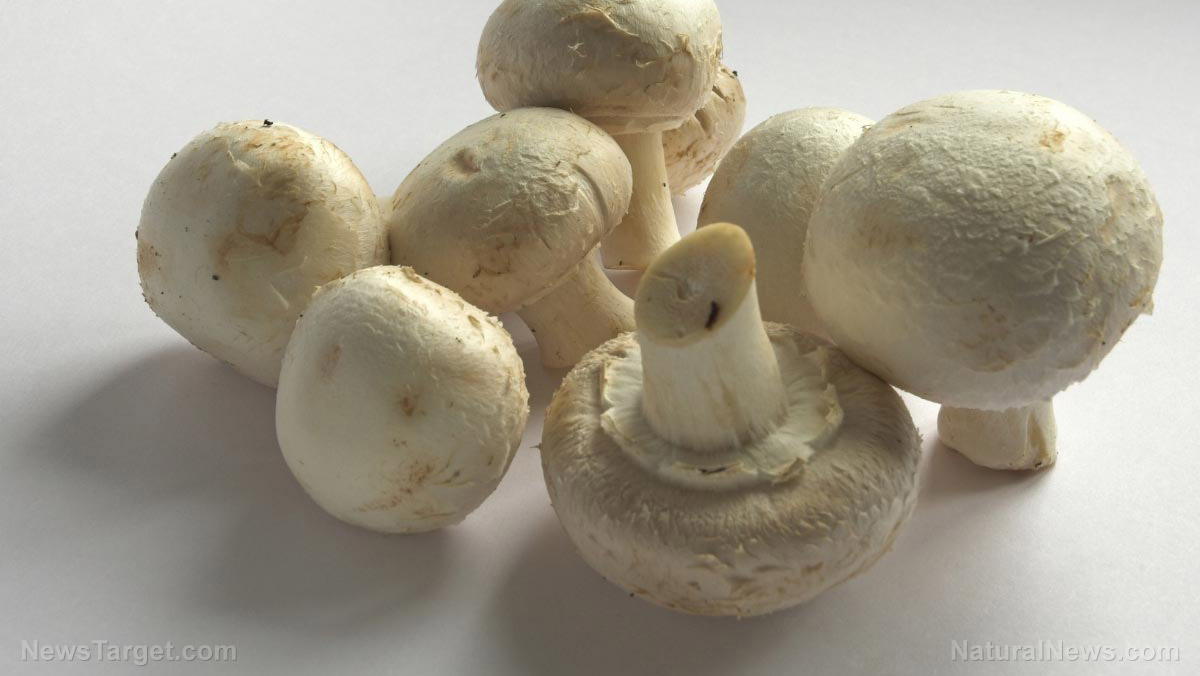Eating mushrooms every day fights chronic disease: Button mushrooms are high in antioxidants, researchers discover
12/12/2017 / By Michelle Simmons

Eating small portions of mushrooms every day can make a big impact on your health. A recent study has found that mushrooms, particularly button mushrooms, contain important antioxidants that fight off chronic diseases, such as dementia, heart disease, and cancer.
To reach this conclusion, researchers from Pennsylvania State University analyzed the relationship between mushroom consumption and the prevalence of chronic disease in people. In the study, which was published in the journal Food Chemistry, they examined 13 species of mushrooms. They discovered that two antioxidants found in mushrooms, ergothioneine and glutathione, fight off the free radicals associated with dementia, different types of cancers, and even cardiovascular disease. Free radicals are released when the body uses food to produce energy. These travel through the body to pair up with other electrons, which cause damage to cells, proteins, and DNA known as oxidative stress. Replacing antioxidants in the body may help prevent oxidative stress.
“Without a doubt, mushrooms are the highest dietary source of these two antioxidants,” said Robert Beelman, lead research of the study.
Beelman and his team found that the amounts of the two antioxidants differ by species. They discovered that porcini mushrooms, which are popular in Italy, had the highest content of ergothioneine, while maitake contained the highest amount of glutathione. On the other hand, the mushroom variety that contained the lowest amounts of the two antioxidants was chanterelles, a wild variety popular as a culinary delicacy. Yet, even though the more common types of mushroom, such as the white button, had less of these antioxidants, they had greater amounts compared to most other foods.
The researchers also discovered that even if mushrooms were to be cooked, they would still maintain their antioxidant content. Furthermore, they found that the amounts of ergothioneine and glutathione within given species were significantly correlated.
Although the effect of ergothioneine is not entirely clear, earlier research has suggested that it may aid in maintaining glutathione levels by interacting with other cellular defense systems. On the other hand, glutathione has been previously known to maintain immune function, detoxify carcinogens, and other toxins. Moreover, high levels of glutathione help maintain health and prevent diseases.
Mice studies have also shown that ergothioneine has a protective effect against beta-amyloid plaque accumulation. Meanwhile, some studies also suggest that consumption of ergothioneine may decrease the risk of cognitive decline.
Countries that include ergothioneine in their meals, such as France and Italy, have lower prevalence of dementia. However, countries that lack the antioxidants in their diets, like the United States, have higher rates of diseases such as Parkinson’s and Alzheimer’s.
“The difference between the countries with low rates of neurodegenerative diseases is about three mg per day, which is about five button mushrooms each day,” Beelman said.
The researchers believe that their findings could eventually be used in anti-aging treatments and strategies based on glutathione and ergothioneine. (Related: Medicinal mushrooms like reishi, maitake can help fight cancer.)
Mushroom types and their other benefits
Mushrooms are fungi that produce spores, which are similar to pollen or seeds. These spores enable them to spread through the wind. Mushroom species can be classified into two — edible and non-edible. Edible mushrooms include button, oyster, porcini, chanterelles, enoki, oyster, maitake, and shiitake. On the other hand, non-edible mushrooms can be poisonous if eaten, such as the death cap, which is the deadliest of all, conocybe filaris, webcaps, autumn skullcap, destroying angels, podostroma cornu-damae, and deadly dapperling.
Edible mushrooms are good sources of protein and fiber. Proteins maintain healthy cells, while fibers aid in digestion and help moderate blood pressure and cholesterol. They also contain B vitamins and selenium, which is an antioxidant that helps support the immune system and prevent cell and tissue damage. They are also a good source of vitamin D, particularly white button mushrooms, which are one of the few non-animal sources of the vitamin.
Find out more health benefits of mushrooms at AlternativeMedicine.news.
Sources include:
Tagged Under: Alzheimer's, antioxidant content, antioxidants, brain health, Button mushroom, cancer, chronic diseases, dementia, detoxify, ergothioneine, food is medicine, free radical damage, Glutathione, health benefits of mushrooms, heart disease, heart health, Mushrooms, natural remedies, neurodegenerative disease, oxidative stress, Parkinsons, prevent disease




















